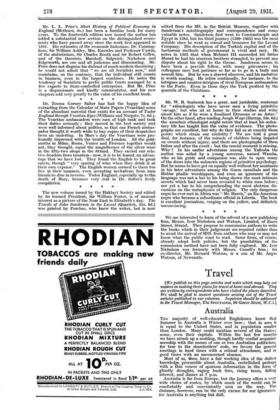Dr. Emma Gurney Salter has had the happy idea of
extracting from the Calendar of State Papers (Venetian) some Of the abundant material that exists for an account of Tudor England through Venetian Eyes (Williams and Norgate, 7s. 6d.). The Venetian ambassadors were men of high rank and took their duties seriously ; they moved in the best society and were well informed about politics, so that one French ambas- sador thought it worth while to buy copies of their despatches • from an underling. In Mary's day the Venetians were pro- foundly impressed with the wealth of London. All the gold- smiths in Milan, Rome, Venice and Florence together would not, they thought, equal the magnificence of the silver ware in the fifty-two shops in the Strand. They envied our rela- tive freedom from taxation—now, it is to be feared, an advan- tage that we have lost. They found the English to be great eaters, though " very sparing of wine when they drink it at their own expense." The English women seemed to them too free in their manners, even accepting invitations from men friends to dine in taverns. Tudor England, especially up to the death of Mary, becomes very real in Dr. Safter's lively compilation.
* * * *


























 Previous page
Previous page